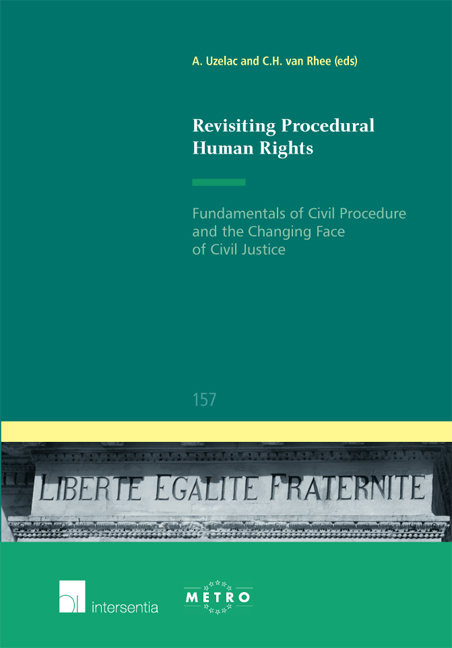 Revisiting Procedural Human Rights
Revisiting Procedural Human Rights Book contents
- Frontmatter
- Table of Contents
- List of Authors
- List of Abbreviations
- Acknowledgements
- Introduction
- The Human Right to Accessible and Foreseeable Justice
- Fundamental Procedural Rights from a National Angle
- Doing Justice: Chinese Civil Procedure and its Reform
- The Presumption of Innocence in Civil Cases
- Fighting Recession at the Expense of Access to Justice. The Case of the Croatian Financial Operations and Pre-Bankruptcy Settlement Act
- The Right Principles – What Outcome? Fundamental Procedural Rights and their Implementation in Romanian Civil Procedure and Other Legal Systems
- What is Happening to Fundamental Procedural Guarantees in the Area of Civil Justice? A View from South Africa
- Judicial Reform in Russia and its Impact on Procedural Human Rights and Access to Justice
- Conditions of Admissibility and Access to Justice – A Slovenian Perspective
- Wheels of History: Fair Trial Rights in Historical Perspective
- Equal Justice for all: Empirical and Normative Approaches to Legal Aid and Assistance in Civil and Administrative Cases
- Ius Commune Europaeum
The Right Principles – What Outcome? Fundamental Procedural Rights and their Implementation in Romanian Civil Procedure and Other Legal Systems
from Fundamental Procedural Rights from a National Angle
Published online by Cambridge University Press: 13 October 2018
- Frontmatter
- Table of Contents
- List of Authors
- List of Abbreviations
- Acknowledgements
- Introduction
- The Human Right to Accessible and Foreseeable Justice
- Fundamental Procedural Rights from a National Angle
- Doing Justice: Chinese Civil Procedure and its Reform
- The Presumption of Innocence in Civil Cases
- Fighting Recession at the Expense of Access to Justice. The Case of the Croatian Financial Operations and Pre-Bankruptcy Settlement Act
- The Right Principles – What Outcome? Fundamental Procedural Rights and their Implementation in Romanian Civil Procedure and Other Legal Systems
- What is Happening to Fundamental Procedural Guarantees in the Area of Civil Justice? A View from South Africa
- Judicial Reform in Russia and its Impact on Procedural Human Rights and Access to Justice
- Conditions of Admissibility and Access to Justice – A Slovenian Perspective
- Wheels of History: Fair Trial Rights in Historical Perspective
- Equal Justice for all: Empirical and Normative Approaches to Legal Aid and Assistance in Civil and Administrative Cases
- Ius Commune Europaeum
Summary
Foreword
The European Convention on Human Rights (the Convention) was to a certain extent disregarded in Romania in the early 1990s. I suppose that, for most of society, the Convention and all its machinery seemed somewhat irrelevant in those times. Romania ratified the Convention in 1994 and, since then, the Convention has sort of forced its way forward, growing into a decisive instrument that has influenced the Romanian legal system and the collective conscience. The provisions of the Convention and the case law of the European Court of Human Rights (ECtHR) proved to be effective in the struggle against the reluctance of state authorities to put into place expected substantial reforms. Confronted with this instrument, the state and justice system found themselves under constant pressure for changes – in legislation and in the case law, but also in their general perspective regarding their relation with the citizenry.
A new code of civil procedure was adopted in 2013. The need to further align the procedural legislation with the standards of the Convention was seen as one of the main reasons a new code was necessary. On the other hand, it was intended that the enactment of the code would bring an end to the continuous series of modifications brought to civil procedure, a process marked by hesitation and lack of coherence and consistency.
Fundamental procedural rights are explicitly enunciated by the new code as principles of civil procedure. The question remains whether or not fundamental procedural rights and principles such as the right to a trial within a reasonable time, the right to an effective remedy and legal certainty have been appropriately implemented by the new code.
Convention Violations
Romania had, most certainly, its fair share of ‘contributions’ to the development of the case law of the ECtHR. This is not actually a merit, of course. Any admission decision of the Court reveals a violation of the Convention, a dysfunction in one legal system or another.
As regards Romania, violations were found in matters such as restitution and compensation of property nationalized or confiscated by the state before 1989, enforcement of judgments and access to court. The most significant infringements were found in connection with the concept of legal certainty and the right to a trial within a reasonable time.
- Type
- Chapter
- Information
- Revisiting Procedural Human RightsFundamentals of Civil Procedure and the Changing Face of Civil Justice, pp. 157 - 178Publisher: IntersentiaPrint publication year: 2017


